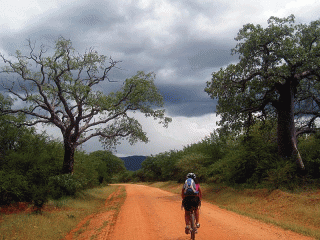The raw and unpredictable nature of the African continent provides many challenges. The cycling terrain includes sandy corrugated roads switch-backing out of a river gorge or thick red muds that cake your drive train. Other days the tarmac is like black silk. The climate provides extremes of wind, rain, heat and cold, from the sweltering humidity of Lake Malawi to brisk starry skies of the Nubian Desert. Participants and their equipment
must be prepared for anything and everything. Cultural discrepancies create different obstacles; learning new languages, calculating exchange rates, adjusting your digestive system to bizarre foods or trying to comprehend the practices of another religion. Being physically fit or technically prepared are great assets, but ultimately it is the mentally strong who succeed.
Although Tour d’Afrique facilitates the experience, the true adventure depends on the spirit of the individual. There are opportunities to climb Mt. Kilimanjaro, take a safari through the Serengeti, paddle the Zambezi or sand board in the Namibian dunes, but often the most memorable moments take place far from the tourist hubs. For some it may be as simple as sharing a cup of chai and a conversation with the elders of a remote village. Others thrive on the smiles of children while volunteering to teach an English lesson at an impoverished school house. African music is what stirs my soul.
One night in Zambia I was retiring to my tent but I could hear the faint rhythm of drums from off in the distance. Knowing I couldn’t sleep listening to it decided to seek it out. I found a path leading through the dark forest and as I followed it the music got louder. I could hear laughter, chanting and random whistle blasts driving the tempo. The scene was a small village nestled among baobabs and acacias. There was fire, vats of chibuku, clouds of Malawi cob, and men, women and children all in celebration. As the only mzungu I quickly drew attention to myself. The people were incredibly hospitable. They were reluctant to let me play the drums, but then were quite taken back when I started to rip syncopated Afro-Cuban beats off their homemade Ngoma’s. Before I offended the village percussionists I gave up the drums and took to dancing. With my eyes closed I stomped and spun around the fire, until I was approached by a man who spoke perfect English. He informed me that they villagers had prepared something special for me. The music changed and four women in white robes with faces painted white emerged from the darkness and started dancing around me.
Shortly after that I politely thanked the elders and excused myself. If I stayed any longer I was afraid I might go home married. Although the international language of music is what forged my initial bond, to experience a foreign culture you must remove all inhibitions and immerse yourself.
